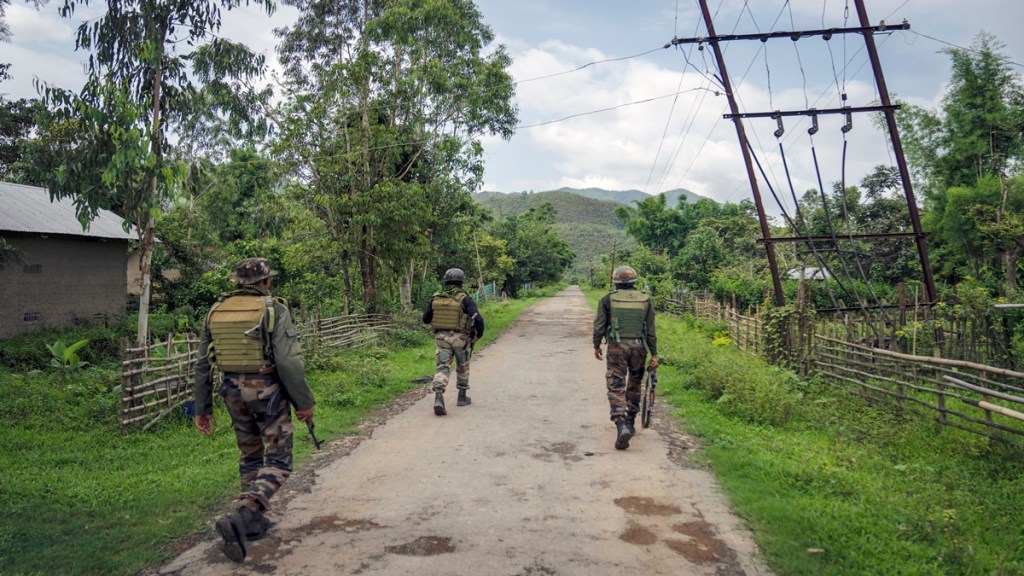I hold the view that if normal people of average intelligence behave as if they have lost their senses, it is because there is a method in their madness. Nothing illustrates this better than the conduct of the government of India while the state of Manipur burns.
The BJP holds the reins of government in Delhi and in Imphal, the capital of Manipur. There are channels of communication within the party. There are administrative channels of communication from the governor and the Intelligence Bureau to civil society organisations and the media.
Ethnic cleansing?
What is happening in Manipur is not the occasional brawl; it is not opportunistic crime; it is not random incidents of murder or rape; it is not plunder and loot for gain. It is — let us not mince words — the beginning of ethnic cleansing.
The dreaded phrase has come to haunt India. ‘Ethnic cleansing’ has been defined as the attempt to get rid (through deportation, displacement or even mass killing) members of an unwanted ethnic group in order to establish an ethnically homogeneous geographic area (history.com editors). Historians cite examples of the massacre of Armenians during World War I and the Holocaust in which 6 million European Jews were killed. Serbia in Europe and some African countries have witnessed ethnic cleansing.
Manipur was recognised by the Constitution as a state with a defined territory in which three major ethnic groups live. In my column (Incompetence, Injury & Insult, Indian Express, July 25, 2023), I had pointed out that, by and large, the Meitei live in the valley (40 seats in the State Assembly), the Kuki-Zomi live in four districts (10 seats) and the Naga live in the four hill districts (10 seats). Irrespective of the political party, the MLA identifies with his/her tribe. Effectively, Meitei rule the state.
Today, from all reports that I have received or read, there is practically no Kuki-Zomi in the valley and there is no Meitei in the areas dominated by the Kuki-Zomi. That includes, I am told, government employees. Mr Babu Verghese, a journalist who visited Manipur, told Mr Karan Thapar that “there are no Meitei in the hills and no Kuki in the valley and, therefore, there is effective demographic and geographical separation.” Violence has forced hundreds of families to migrate to safer districts/places. I am also told that the chief minister and his ministers work out of their home offices and do not — or cannot — travel to the affected areas. It is obvious that their writ does not run beyond the neighbourhood of their homes and offices. None of the ethnic groups trusts the Manipur police. The central armed police forces were under some kind of restraint until recently. The Army has been given a limited mandate. As a result, killing continues for several weeks after May 3. No one believes the official numbers of the casualties. Women are the worst sufferers. Rape and gang rape are weapons that are employed to humiliate and terrorise the vulnerable people in a conflict area. Hundreds have suffered such violence and humiliation. One of them was the wife of a Kargil hero.
The greater danger is that once ethnic cleansing begins, it is contagious. Meitei living in neighbouring Mizoram have been warned to leave the state. 600 Meitei may have left.
Ignorance or inaction?
The case of the alleged molestation of two women on May 4 illustrates the dire situation of Manipur. One of the women charged that the police stood and watched while the mob took away the women. The victims were able to lodge an FIR only on May 18. Another FIR was lodged in June 21. The woman told the police that she had recognised some members of the mob including “a friend of her brother’s”. No action was taken for 75 days. The SP, DGP and the Chief Secretary did nothing. On receiving a letter from an American Manipur Association about the incident of May 4, the National Commission for Women “informed” the CS and the DGP on June 19, but did nothing more. The National Human Rights Commission took no notice. Despite the many channels of communication, the chief minister claimed that he had no knowledge of the incident! All were jolted out of their slumber only when a video of the horrific crime went viral on or about July 19. If this is not a case of the complete collapse of Constitutional government in Manipur, we might as well repeal Articles 355 and 356 of the Constitution.
The Nellie (Assam) massacre of 1983 was discussed in Parliament. Yet, since July 20, the Treasury Benches and the Opposition in Parliament cannot agree on the rule under which a debate on the Manipur crisis should be held. The government stubbornly maintains that the Hon’ble prime minister will not make a statement in Parliament. The impasse points to the depressing conclusion that Parliament has become dysfunctional and has failed the people of the country.
A heap of ruins
A dysfunctional Parliament, the collapse of a state government, unwillingness to use Article 356, ethnic cleansing, continuing violence — what more can this country endure? The hope of the founding fathers and mothers that we will build a multi-racial, multi-religious, multi-cultural and multi-lingual nation where liberty, equality and fraternity will prevail lies in a heap of ruins.

